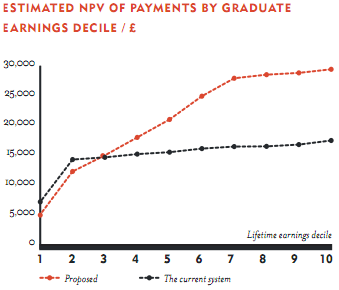I stumbled upon this rather interesting graphic on the net a few days ago (it is taken from the Browne review so not perfect but illustrates the gist of the changes):
 |
| One increases with income, one levels out, which would you say is progressive? |
I think it's interesting to show that those who are hit hardest are the top half of graduate earners - surely these are the people who should be making the greatest contribution? To me it shows the the current system is not very progressive at all - as long as you're not in the bottom 10% you'll contribute roughly as much to your education as those who are in the top 10% of graduate earners. Some will say this is fair as it represents the price of the course - others will point out that the state shouldn't really be subsidising those who go on to be benefit greatly from their studies as they can now afford to pay.
Under the new system however, those who earn the most (the top 30-40% of graduates) will end up paying back considerably more than those who don't do so well following graduation. In fact the bottom 30% or so are better off even in the long run from this change. To me this looks like the definition of a progressive tax, those with the ability to pay more paying more than those who don't. It is worth emphasising that all of these payments are only made once the student is earning money and only comes out of their incremental earnings above £21,000 (previously £15,000) so there will be no question of any of them being able to afford the payments.
The more I listen to the debate the angrier I get at Labour and NUS for politicising this as it is a progressive change - yes free education may be a utopian ideal, one that I still think I'd like to see if possible, but that really is regressive. I'd like to see the above graph showing the exact details as per the governments actual policy, I fancy that would be even more progressive.
No comments:
Post a Comment